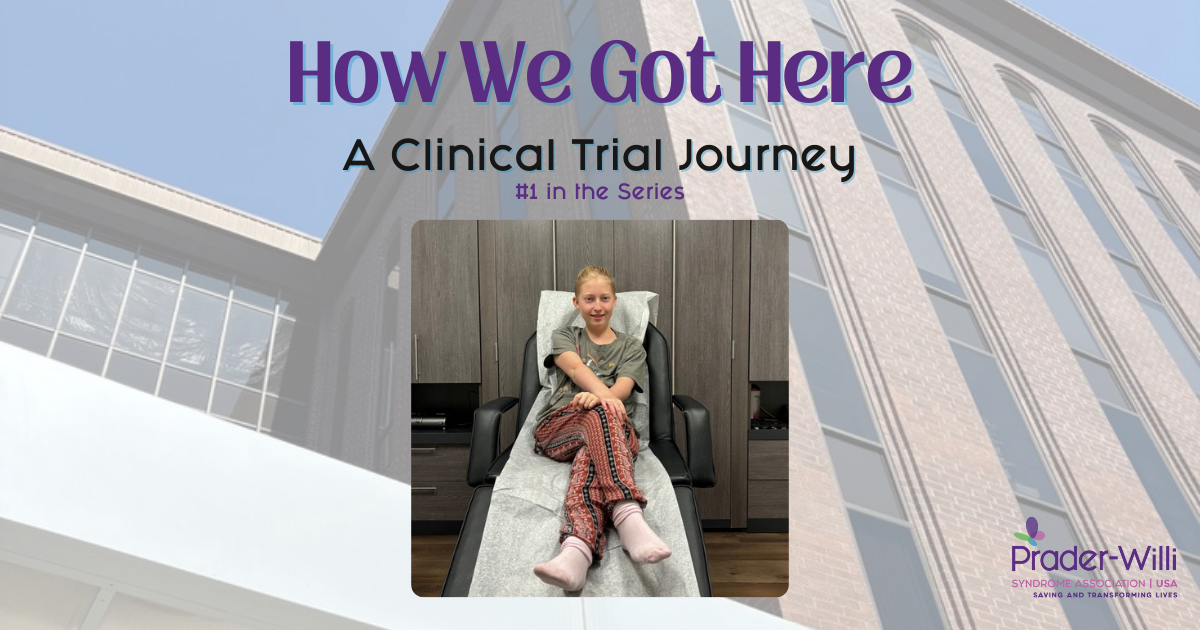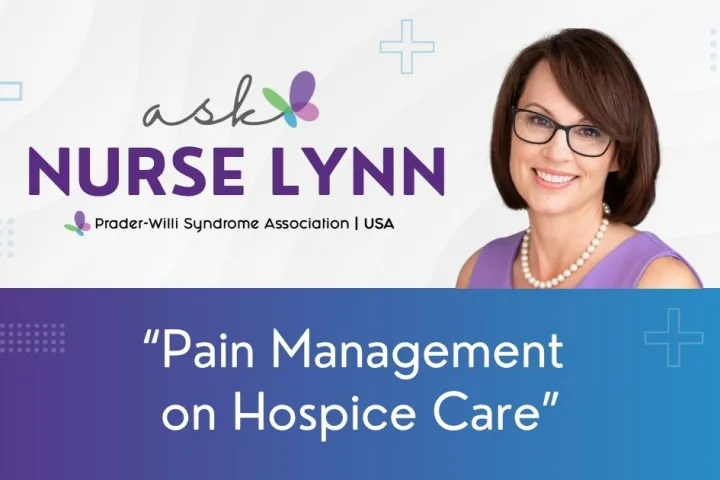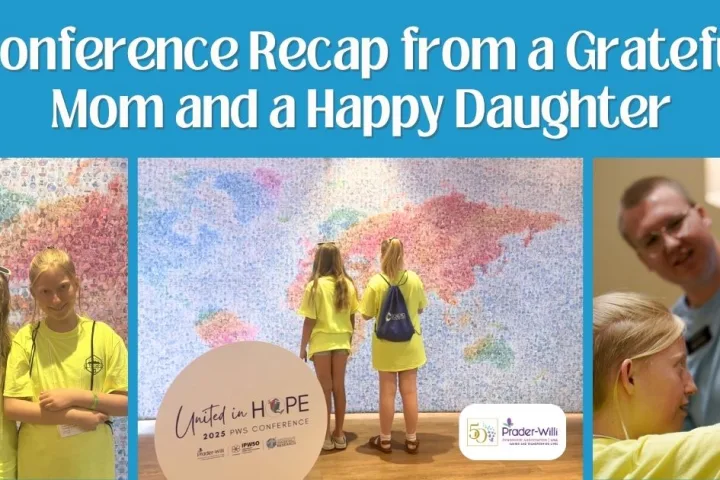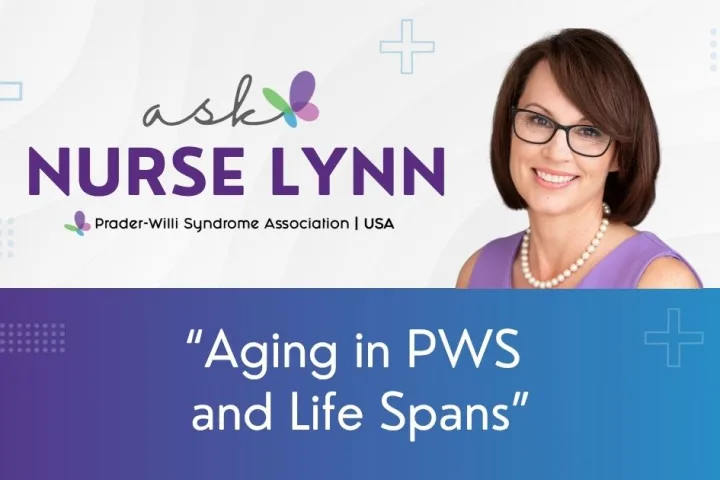contributed by Anne Fricke
I lay awake in a pre-dawn haze the morning Freya was to take her first pill. We had been to Southern California twice already, a combination of 7 flights up and down the coastline, numerous hours of travel, and far too many airport meals, and I was still momentarily on the precipice of turning away from this opportunity. My mind rattled off questions and waded through belated concerns… “Did I make the right choice? Should I have tried that supplement first? Does she really understand what this is about? What if we chose wrong?”
I tucked my fear and worry deep under the blankets and rose to give Freya her first dose of either placebo or Pitolisant. No lightning crashed from the sky, no thunder clouds rolled in, the lights didn’t flicker. The pills were so small that Freya even asked me if she had actually swallowed them. I assured her she had and there we were 1 day into a 77-day trial in the name of furthering PWS research and improving Freya’s quality of life.
I’m not altruistic enough to say we’re simply doing it for the former reason, furthering PWS research. I dare say most parents would agree. The act of using my child as a guinea pig in a pharmaceutical experiment is not one I would have ever considered. But when you see your loved one’s everyday struggles, how severely their life may be affected by the challenges of their disorder, the obstacles one after another thrown in their path, and someone offers you a possibility, a way to potentially remove a few of those obstacles…well, the potential benefit may outweigh the risk.
To be clear, Freya is in a Phase 3 trial, with a medication that has been around for quite a while. In the realm of clinical trials, phase 3 trials are fairly tried, tested, and approved. I’ve spoken with some families whose loved one is in this particular trial and they shared how life-changing this medication has been. I must remember that it may not be that way for Freya, but it seems worth a try with limited risk.
Ultimately, why did I have a change of heart? Why, when I spent a good few decades of my life with a strong skepticism of Western medicine and pharmaceutical companies, am I now diving headfirst into those potentially murky waters? Because Freya wants to.
After Freya woke from a random any-time-of-day nap, just another in an incredibly long line of random naps, I asked her how she felt about her daytime sleep episodes. “I don’t like them,” she replied. When I asked why, she lamented that they caused her to miss out on life. Sometimes it’s what her peers are doing at school, sometimes it’s family adventures or hang out time, and sometimes it’s just trying to do something that she enjoys. When I told her there might be a pill that could help her stay awake and asked if she would like to take it, she immediately exclaimed, “Yes!”
That “yes” carried us through some introductory emails to a few California sites, a phone screening, an in-person screening, and our baseline appointment to receive the medication or the placebo. I will go into detail on the logistics of these first few appointments elsewhere, but it felt important to start with the why.
We are doing this trial because it feels good to do SOMETHING, to try something different and bring more helpers onto Freya’s side to increase her chances of enjoying life. While the chance to further PWS research may not be our initial reason for joining this trial, it does feel good. We love this community and are constantly and consistently inspired by what families are bringing. We want to be a part of the sharing.
We’re doing this trial because I love when Freya is vibrant and focused and able to participate in her life. It hurts when I see the exhaustion on her face, the tears welling in her eyes or the rage pooling on the surface because she is too exhausted to process or handle the escalating emotions.
Freya is excited for this opportunity and the potential changes it will bring to her life. We are doing this trial, ultimately, because she wants to participate. Freya no longer wants daytime sleepiness to cause her to feel like she “wasted her life” and hopes to “feel amazing that I don’t have to sleep during the daytime.”
Read More in the Series
If you’d like to read about the details and logistics of enrolling in a clinical trial and what the first appointment may look like, please check out “The Screening Appointment.”
Share this!





 Jennifer Bolander has been serving as a Special Education Specialist for PWSA (USA) since October of 2015. She is a graduate of John Carroll University and lives in Ohio with her husband Brad and daughters Kate (17), and Sophia (13) who was born with PWS.
Jennifer Bolander has been serving as a Special Education Specialist for PWSA (USA) since October of 2015. She is a graduate of John Carroll University and lives in Ohio with her husband Brad and daughters Kate (17), and Sophia (13) who was born with PWS. Perry A. Zirkel has written more than 1,500 publications on various aspects of school law, with an emphasis on legal issues in special education. He writes a regular column for NAESP’s Principal magazine and NASP’s Communiqué newsletter, and he did so previously for Phi Delta Kappan and Teaching Exceptional Children.
Perry A. Zirkel has written more than 1,500 publications on various aspects of school law, with an emphasis on legal issues in special education. He writes a regular column for NAESP’s Principal magazine and NASP’s Communiqué newsletter, and he did so previously for Phi Delta Kappan and Teaching Exceptional Children. Evan has worked with the Prader-Willi Syndrome Association (USA) since 2007 primarily as a Crisis Intervention and Family Support Counselor. Evans works with parents and schools to foster strong collaborative relationships and appropriate educational environments for students with PWS.
Evan has worked with the Prader-Willi Syndrome Association (USA) since 2007 primarily as a Crisis Intervention and Family Support Counselor. Evans works with parents and schools to foster strong collaborative relationships and appropriate educational environments for students with PWS. Dr. Amy McTighe is the PWS Program Manager and Inpatient Teacher at the Center for Prader-Willi Syndrome at the Children’s Institute of Pittsburgh. She graduated from Duquesne University receiving her Bachelor’s and Master’s degree in Education with a focus on elementary education, special education, and language arts.
Dr. Amy McTighe is the PWS Program Manager and Inpatient Teacher at the Center for Prader-Willi Syndrome at the Children’s Institute of Pittsburgh. She graduated from Duquesne University receiving her Bachelor’s and Master’s degree in Education with a focus on elementary education, special education, and language arts. Staci Zimmerman works for Prader-Willi Syndrome Association of Colorado as an Individualized Education Program (IEP) consultant. Staci collaborates with the PWS multi-disciplinary clinic at the Children’s Hospital in Denver supporting families and school districts around the United States with their child’s Individual Educational Plan.
Staci Zimmerman works for Prader-Willi Syndrome Association of Colorado as an Individualized Education Program (IEP) consultant. Staci collaborates with the PWS multi-disciplinary clinic at the Children’s Hospital in Denver supporting families and school districts around the United States with their child’s Individual Educational Plan. Founded in 2001, SDLC is a non-profit legal services organization dedicated to protecting and advancing the legal rights of people with disabilities throughout the South. It partners with the Southern Poverty Law Center, Protection and Advocacy (P&A) programs, Legal Services Corporations (LSC) and disability organizations on major, systemic disability rights issues involving the Individuals with Disabilities Education Act (IDEA), Americans with Disabilities Act (ADA), and the federal Medicaid Act. Recently in November 2014, Jim retired.
Founded in 2001, SDLC is a non-profit legal services organization dedicated to protecting and advancing the legal rights of people with disabilities throughout the South. It partners with the Southern Poverty Law Center, Protection and Advocacy (P&A) programs, Legal Services Corporations (LSC) and disability organizations on major, systemic disability rights issues involving the Individuals with Disabilities Education Act (IDEA), Americans with Disabilities Act (ADA), and the federal Medicaid Act. Recently in November 2014, Jim retired.